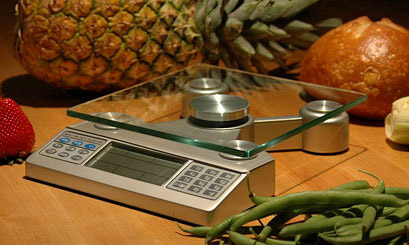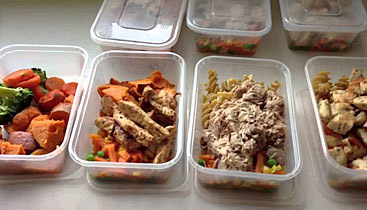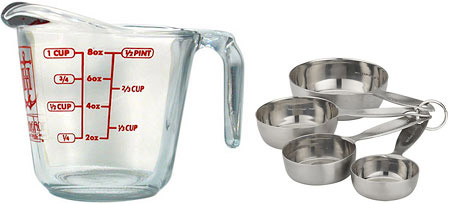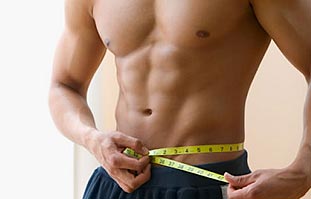WHY YOU NEED A FOOD SCALE TO TRACK CALORIES & MACROS PROPERLY

If you’re truly serious about transforming your body in the fastest and most efficient way possible, proper dietary tracking is key.
Unless you have incredibly good genetics or just happen to get lucky, trying to maximize your muscle building and fat burning results by simply “winging” your diet throughout the day is likely going to leave you disappointed.
If you’re looking to create a proper calorie surplus that optimizes lean muscle growth while minimizing fat gains, or a proper calorie deficit that optimizes fat loss while minimizing muscle loss, you need to be tracking your food intake with a reasonable level of accuracy each day.

However, if you’re trying to track calories and macros using typical measuring cups, spoons or merely by estimating, there’s a good chance that you’re actually missing the mark without even realizing it.

This is because measuring cups are intended to measure volume rather than weight, and depending on the shape of the item you’re trying to measure out, how hard you press or what angle you pour at, measuring cups and spoons can often be very inconsistent and end up providing you with quite a few more or quite a few less calories than you think you’re actually getting.
This may not be a big deal if it only happens here and there, but add up these inaccurate measurements over the course of a full day or week and it truly can have a real negative impact on your bottom line results.
When you consider the fact that consistently gaining new muscle or losing fat on a weekly basis often comes down to just a few hundred calories give or take each day, and you’ll quickly see how important this really is.
If you really want to precisely track your calories and macros in order to fully maximize your results, you need to be using a food scale when weighing out your portions.
![]()
This is the only way to know for sure that you’re truly getting the calorie and macronutrient amounts that you’re aiming for.
For example, 1 cup of brown rice should deliver about 195 grams of total weight and provide 216 calories. But measure out that 1 cup of rice using a regular measuring cup and then measure the actual weight using a food scale, and you’ll often find that the amounts differ quite a bit.
Or take 1 tablespoon of peanut butter as another example. This should deliver 15 grams of total weight and about 100 calories, but since most people’s idea of what constitutes a “tablespoon of peanut butter” varies quite a bit (especially depending on how hungry they are), you’ll often end up with calorie amounts that range all over the map.
Now, I understand that the use of a food scale might sound overly “obsessive” to some people, so I should mention the following…
First off, using a food scale is actually very easy and really doesn’t require any more time or hassle above and beyond using regular measuring cups.
Secondly, using a food scale really is the only way to accurately determine exactly how much protein, carbohydrates, fats and total calories you’re taking in each day.
If you’re training hard at the gym and putting in the effort to consistently stick to your daily meal plan, the last thing you’d want to do is accidentally sabotage your results by simply not measuring your portions correctly.
Thirdly, all of this information assumes that your goal is to achieve the very best results possible by fully maximizing muscle growth while minimizing fat gains, or by fully maximizing fat loss while minimizing muscle loss.
It certainly is still possible to achieve significant results without precisely measuring your food out every day as long as you’re able to estimate with decent accuracy.

However, your margin for error will increase by quite a bit, and it’s far more likely that you’ll end up out of your optimal calorie and macronutrient ranges.
The consequence of this is that:
1) If you’re on a bulk, you’ll either gain muscle below your maximum potential (this will happen if your calories are too low), or you’ll gain muscle at your maximum potential but also gain an excessive amount of body fat (this will happen if your calories are too high).
2) If you’re on a cut, you’ll either lose fat below your maximum potential (this will happen if your calories are too high), or you’ll lose fat at your maximum potential but will also lose an excessive amount of lean muscle tissue (this will happen if your calories are too low).
So, the specific level of tracking that you decide to employ is up to you and depends on how serious you are about your results.
One thing is for certain though, and that is that if you want to optimize your results and transform your body as quickly and efficiently as possible, then properly tracking your food intake is a must, and using a food scale is the best way to go about it.
I don’t have any particular food scale that I recommend at the moment, but just aim for a digital scale that measures both grams and ounces and that ideally has a “reset to 0” feature as this makes it easier to use.
If you found this article helpful, make sure to sign up for your FREE custom fitness plan below...




